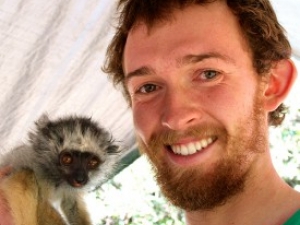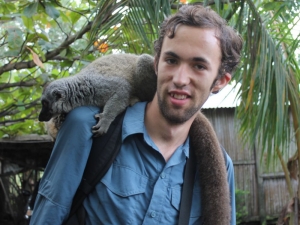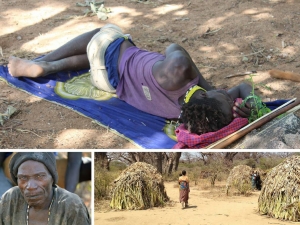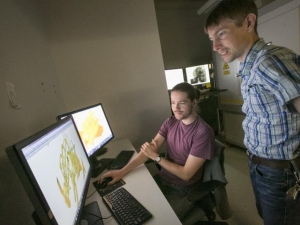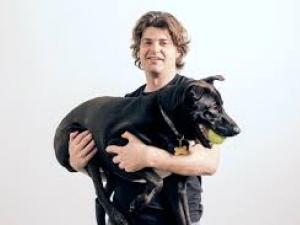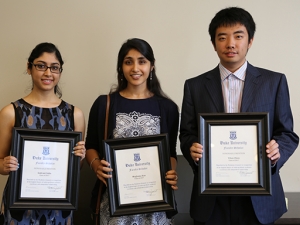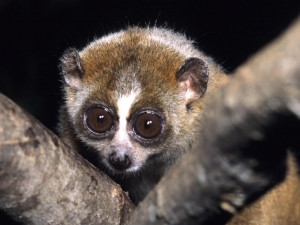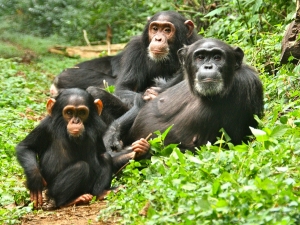Brandon Semel (EvAnth '13) was recently awarded funding for conservation work with lemurs read more about EvAnth Alum awarded lemur conservation grant »
Kyle Smith ('16) quoted in news article on dogs and mail carriers. read more about EvAnth Alum in the news »
The Boyer lab's MorphoSource is an international resource for sharing data. Undergraduates have also been able to make use of this valuable database. read more about Building a Virtual Ark for Lemurs »
The 2016 Faculty Scholars: Indrani Saha, Meghana Rao and Yilun Zhou. Many Duke undergraduates have found excitement in an original research project. Junior Meghana Rao has taken her research one step further and connected it in a socially meaningful way to problems right here in Durham. Rao is conducting research on the gut microbiome of long-tailed macaques, attempting to see how changes in diet and social status affect the trillion of microbes inside the primates. Evolutionary Anthropology Assistant Professor… read more about Three Juniors Honored With Faculty Scholars Award »
Humans aren’t alone in their ability to mix perfumes and colognes. Lemurs, too, get more out of their smelly secretions by combining fragrances to create richer, longer-lasting scents, finds a study led by Duke University.The results appear online April 20 in Royal Society Open Science.The “perfume” of the ring-tailed lemur could never be confused with Chanel. Male ring-tailed lemurs, our distant primate cousins, produce their distinctive musky odor with help from a pair of glands on their wrists that give off droplets of… read more about Lemurs Mix Smelly Secretions to Make Richer, Longer-Lasting Scents »
The bearcat. The binturong. Whatever you call this shy, shaggy-haired creature from Southeast Asia, many people who have met one notice the same thing: it smells like a movie theater snack bar.Most describe it as hot buttered popcorn. And for good reason -- the chemical compound that gives freshly made popcorn its mouthwatering smell is also the major aroma emitted by binturong pee, finds a new study.Most people have never heard of a binturong, let alone caught a whiff of one up close. But for many zookeepers, the… read more about Why Bearcats Smell Like Buttered Popcorn »
Isabelle Clark, a senior majoringing in Evolutionary Anthropology, has been named a finalist in the research poster competition at the upcoming annual meeting of the International Primatology Society/American Society of Primatologists. Congratulations Isabelle! read more about EvAnth major Isabelle Clark a finalist in IPS/ASP poster competition »
Evolutionary Anthropology graduate students Lydia Greene and Kendra Smyth took time off from their dissertation work to share their expertise in data analysis with undergraduates engaged in senior honors research. read more about Evolutionary Anthropology graduate students share expertise in data analysis »
Duke scientist-explorer Elwyn Simons, who studied living and extinct primates for more than 50 years, died in his sleep on Sunday, March 6, in Peoria, Arizona. He was 85.Widely regarded as the founder of modern primate paleontology, Simons was an expert on the history of primates leading up to humans. Simons’ fossil-hunting expeditions and primate conservation work took him all over the globe, from the badlands of Wyoming to the Egyptian desert and the rainforests of Madagascar. From 1961 to 2012, he led more than 90 field… read more about Fossil Expert and Primate Conservationist Elwyn Simons Dies at 85 »
For the 12th straight year, Duke University is one of the top producers of U.S. Fulbright Scholars, with 12 students awarded the latest scholarships, the U.S. Department of State announced Monday.The Fulbright Program is the U.S. government’s flagship international educational exchange program. The success of the top-producing institutions is highlighted in The Chronicle of Higher Education. "We are delighted to see Duke named as a top producer of Fulbright Scholars for the 12th year in a row, which is really a… read more about 12 Duke Graduates Named Fulbright Scholars »
Two Duke faculty are among 126 chosen to be this year’s Sloan Research Fellows from the Alfred P. Sloan Foundation.Jenny Tung is an assistant professor of evolutionary anthropology and biology who is exploring the interaction between genes and the environment. Her work pairs a 40-year study of social interactions and life course among the Amboseli baboons of Kenya with the latest genetic analyses. She is also affiliated with the Science & Society initiative and the Duke Institute for Brain Sciences.Qiu Wang is an… read more about Two Junior Faculty Named 2016 Sloan Fellows »
3-D scan of the fossilized skull of Homo naledi, an ancient human whose remains were discovered in a South African cave. The creature is one of more than 500 extinct species whose fossil scans are available for anyone to download at http://MorphoSource.org. Reconstruction by Peter Schmid and Ashley Kruger, University of the Witwatersrand.Duke assistant professor Doug Boyer’s office is more than 8,000 miles away from the vault at the University of Witwatersrand in Johannesburg, South Africa, where the fossil remains… read more about Free Site Lets You Download and 3-D Print Fossils »
Professor Ashley Gosselin-Ildari, Visiting Assistant Professor of Evolutionary Anthropology, was recognized by Dean Lee Baker for earning student course evaluations that fell among the top 5% of all undergraduate instructors of small and medium classes at Duke University. Dean Baker praised Dr. Gosselin-Ildari's commitment to teaching, dedication to students, and creative approaches. Well done, Dr. Gosselin-Ildari! read more about Professor Gosselin-Ildari recognized for teaching excellence »
Many people feel anxious in crowds. But not so for prairie voles. When these mouse-like creatures live in close quarters, they are less stressed out, researchers report in the January issue of the journal General and Comparative Endocrinology. The study is part of a larger field of research on how social stresses such as crowding and isolation affect brain chemistry and behavior in many species, including humans.Prairie voles are small rodents ubiquitous in meadows and grasslands in the Midwest and Canada. One of the few… read more about Togetherness Relieves Stress in Prairie Voles »
Spending time in close contact with others often means risking catching germs and getting sick. But being sociable may also help transmit “good” microbes, finds a multi-institutional study of gut microbiomes in chimpanzees.Researchers monitored changes in the gut microbes and social behavior of wild chimpanzees over eight years in Gombe National Park, Tanzania. They found that the number of bacteria species in a chimp’s GI tract goes up when the chimps are more gregarious. The results help scientists better understand the… read more about Gregarious Chimps Harbor Richer Gut Microbiomes »
Insomniacs take heart: Humans get by on significantly less sleep than our closest animal relatives. The secret, according to a new study, is that our sleep is more efficient.Researchers from Duke University scoured the scientific literature and compiled a database of slumber patterns across hundreds of mammals including 21 species of primates -- from baboons and lemurs to orangutans, chimpanzees and people. They then used statistical techniques to account for each species’ position in the primate family tree.They found that… read more about Humans Evolved for Better Sleep In Less Time »
[Updated] The memorial service for Ernestine Friedl, an internationally known anthropologist and first female dean of Trinity College of Arts & Sciences, will be held at 3 p.m. Friday, Oct. 23, in Baldwin Auditorium. A reception will follow in the Friedl Building, the East Campus humanities facility named after her.Friedl died Oct. 12 at The Cedars in Chapel Hill. She was 95.Her deanship was significant as a new structure at Duke, combining the deanship of students in Trinity College with the… read more about Memorial Service for Former Trinity Dean Ernestine Friedl Set for Oct. 23 »
Biological Anthropology and Anatomy alum, Julie Rushmore, is currently working with chimpanzees in Uganda. Her work was recently featured in Discover Magazine. read more about Julie Rushmore (BAA alum) featured in Discover Magazine »

